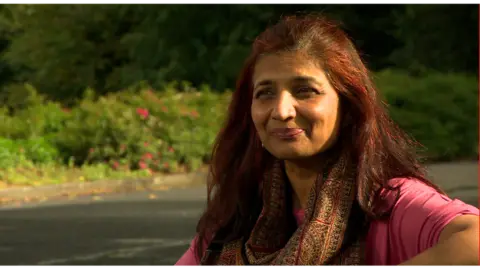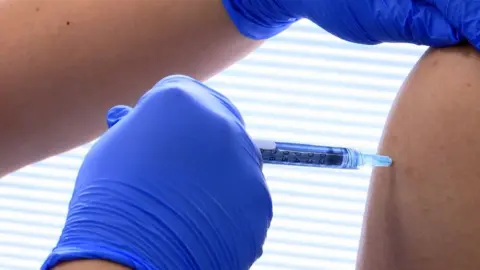Coronavirus: vaccine volunteer 'just wants to play part'
 BBC
BBCA woman who has volunteered to be part of a Covid-19 vaccine trial in Northern Ireland has said she just wants to play her part.
Anita Yakkundi, from Belfast, is among 350 people enrolled for the major trial due to start by the end of this week.
The trial is being run by Novavax, supported by the Public Health Agency.
"The motivation for finding a cure for Covid is so high," Ms Yakkundi, 53, who is married with children, told BBC News NI.
"I think we all want a cure - especially because we belong to the BAME (black and minority ethnic) community where the vulnerability of getting the disease could have significantly greater consequences.
"Yes for any trial there are small risks, but I think the motivation to get somewhere on the other end is so high."
Ms Yakkundi, who lost an uncle in India to the virus this week, said it has affected everyone in different ways.
"It has affected everybody either medically, physically, emotionally, psychologically," she added.
"Covid has impacted everybody in some way or another."
'Small concern'
She said she is going into the trial fully prepared.
"The trials will involve injection of the vaccine and probably followed by a booster dose. Also close monitoring with the trials team and the clinicians," she said.
"They'll be collecting blood samples to check that everything is OK.
"All the information is there and it's fully consented.
"There would be a small concern - as anybody going in a trial would have - but I am happy that I have all the information."
Health Minister Robin Swann announced on Monday that Northern Ireland had been chosen as one of the regions to take part in the major UK trial.
 Novavax
Novavax"The importance of finding a vaccine to help in the battle against this virus cannot be overstated," he said.
"Currently there are over 30 vaccine trials taking place around the world in an effort to discover as soon as possible which will be safe and effective.
"It is vital that Northern Ireland joins this important world-wide effort."
According to the Department of Health, the trial will aim to recruit adults from all parts of society, especially those who are more likely to benefit from a vaccine, including over-65s, the black and minority ethnic (BAME) community and those whose jobs require face-to-face contact with the public.
'Everything comes with a risk'
Dr Janice Bailie, of the Public Health Agency (PHA), said the 350 participants from Northern Ireland would be among about 10,000 volunteers recruited from across the UK, ranging in age from 18 to 84.
Almost 5,000 people have signed up to the vaccine registry in Northern Ireland.
Dr Bailie said Covid-19 vaccine trials were essential to identify which vaccines were both "safe and effective".
"There are different types of vaccines, and we don't know which one will work best to protect people from catching Covid-19," said Dr Bailey.
"It might be that different vaccines are needed for different groups of people, and it's only through vaccine trials we will find this out."
 Reuters
ReutersDr Bailie was asked by BBC's Good Morning Ulster programme about the risk to participants' health.
"Of course, everything comes with a risk and I would be lying if I said there weren't some risks," she replied.
"But research in itself is a very carefully controlled process, very systematic, and the main concern of all researchers is to ensure the safety of all participants in research studies."
Dr Bailie said the vaccine has already been tested by smaller groups of people for safety and effectiveness earlier in the trial, and the process was now entering its third stage.
"Phase three is where larger numbers of people are given the vaccine to see how a population develops immunity response," she said.
"So once people have been given their vaccination, there will be ongoing monitoring through swabbing and blood testing to determine whether they are developing immunity towards coronavirus."
Mr Swann has also emphasised "the importance of the seasonal influenza vaccination programme for all frontline health and social care workers".
"It is essential that all frontline health and social care workers get vaccinated to protect themselves, their families and patients in their care," he added.
"My department has set a target of 75% of health and social care workers receiving the vaccine this year."
